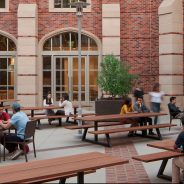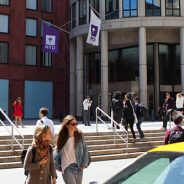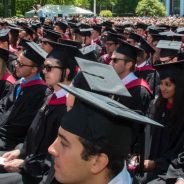Search results for return on investment:
Chicago Booth, Northwestern Kellogg Top Economist 2018 Rankings
The newest Economist best MBA rankings for full-time programs is officially out, with two Chicago schools topping the list.
Finding The Best Affordable Full-Time MBA Programs
Earning an MBA is a great way to ensure some level of financial security in the future. However, if earning the degree leaves you with mountains of debt, that security can start to seem like a pipe dream. Fortunately, there are business schools that provide some of the best affordable full-time MBA programs in the country.
Analyzing the full-time MBA rankings from U.S. News & World Report, we outline ten of the best MBA programs throughout the country that don’t come with the hefty price tag. Check out the ten programs that cost less than $25,000 per semester below.
The Best Affordable Full-Time MBA Programs

The D’Amore-McKim School of Business at Northeastern University charges $1,600 per credit for their 55-credit program. The cost comes to about $22,000 per semester, which is not bad considering the average starting salary for recent grads is $88,000. The Boston school also offers its students a corporate residency while pursuing their degree, which helps alleviate financial pressure. The average salary for the Corporate Residencies was a respectable $32.52 per hour in 2018. Moreover, 91 percent of MBAs receive job offers within three months of graduation. Students with an interest in international business can participate in the Global Consulting Project or International Field Study.

At $11,855 per semester, going to La Salle University allows students to earn their MBAs without breaking the bank. The length of the program varies depending on a student’s previous credits and scheduling choices. Students who majored or minored in business can complete their degree in 12 months, whereas students without a business major or minor may take up to 24 months. Options for specialization include: accounting, business systems and analytics, finance, general business administration, management, and marketing.
Despite the reasonable price tag, La Salle grads have gone on to work high-level positions at well-known companies like Deloitte LLP and Morgan Chase.

The University of Colorado, Boulder Leeds School of Business ranks 65th overall among the best full-time MBA programs on U.S. News, and has a welcoming price tag to back it up. For in-state residents, the program is only $900 per credit ($1,200 for out-of-state residents). Over the course of 55 credits, this comes to just $49,500 for in-state residents over the entire two years of the program: $24,750 per year.
Leeds emphasizes entrepreneurship and a global outlook. The degree electives encourage students to concentrate on finance, marketing, management, or systems-operations. Students can complement this “functional focus” with a more tailored specialization like entrepreneurship, real estate, or sustainability. MBAs are not limited to MBA courses, as the program allows them to take up to four electives in other schools at CU Boulder. Additionally, students earning their MBA in Sustainability have the opportunity to take courses in University of Colorado’s Environmental Studies, Engineering, and Law Schools.

Upstate New Yorkers will be pleased to learn that the Binghamton University School of Management costs about $17,205 (with fees) per year for in-state residents. Non-residents pay about $26,745 (with fees) per year. Binghamton also does not require that entering MBAs have a business background, though they recommend a rudimentary knowledge of calculus, as well as strong skills in English and IT. The standard four-semester MBA is open to students from all undergrad majors. The school is currently 76th on the U.S. News list. Binghamton, NY may also be a strategic career-launch location, as the city made the Forbes list of “The Best Small Places For Business And Careers.”

Internships and opportunities to hobnob abound in the U.S. capital, making DC an excellent place to earn an MBA. However, with the cost of living on the rise, finding a relatively affordable school is key to maximizing return on investment. The cost of pursuing an MBA at the Kogod School of Business at American University comes out to about $20,923 per semester, for a total cost of $83,692. And, with a mean graduate salary of $84,725, it should not take grads long to see a respectable ROI. Kogod offers features like weekly Business Leadership Luncheons, wherein local business pioneers share their experiences and insights with students. Speakers have included senior executives from PayPal, IBM, and Marriott International. Graduates of the program have gone on to work at companies like Amazon, Deloitte, and Ford Motor Company.
YOU MAY ALSO LIKE: The Five Most Valuable Online MBAs

MBAs at the Argryros School of Business—the 79th overall school on the U.S. News list—pay $1,655 per credit. Which, for the 50-credit program, averages to about $20,687 per semester. The Orange County, CA school offers tracks in accounting, business analytics, entertainment and media management, entrepreneurship, finance, global business, marketing, and strategic management. The school also offers a variety of dual degrees, including an MBA/MFA in Film & TV Producing.

The University of San Diego School of Business Administration MBA currently costs $1,420 per credit. With a 56-credit requirement for the two-year program, the cost without fees comes to around $19,880 per semester. It is tied with the aforementioned Argyros School of Business at 79th overall on the U.S. News list of the country’s best business schools.
USD’s curriculum is based on four pillars: Leadership development; business function core; corporate social responsibility, sustainability, and ethics; integrative problem solving. For students with a global mindset, the International MBA has the same cost per credit, but requires only 44 credits.

In addition to being affordable, the Lerner College of Business is located in Delaware, where tax-free shopping makes the cost of living far less daunting. The Lerner MBA costs just $825 per credit for Delaware residents, and $1,000 per credit for those from out of state. This puts total cost per semester in a range from $9,075-$11,000.
Lerner MBAs can choose from a variety of concentrations, including (but not limited to): business analytics, international business, and sport management. Students can pursue a full-time, part-time, online, or hybrid MBA. Pursuing a hybrid of online and on-campus courses may also be fiscally helpful, since online credits tend to be more cost-effective.

The CSU College of Business offers several options for students pursuing an MBA. The school has a nationally renowned online MBA program, and also offers a Global Social and Sustainable Enterprise MBA, an Executive MBA, and an Evening MBA.
According to U.S. News, tuition for the full-time program is $757 per credit for in-state students and $1,557 per credit for out-of-state students. Given the huge cost cut for Colorado natives, CSU may be a prudent choice for residents of the state.

Students who are NYC-bound might consider applying to the Pace University Lubin School of Business. The total cost of an MBA education at Lubin education can vary, as different tracks require a different number of credits. However, at $1,267 per credit, the cost can be very manageable, particularly considering its prime spot in downtown Manhattan and all of the internship and job opportunities this location presents. Particularly for those with a bent toward accounting or finance, Lubin may be the perfect launching pad for a career in the big city. A substantial 92 percent of recent grads found jobs upon graduating.
The Five Most Valuable Online MBAs
Choosing an online MBA program isn’t easy. Not only do you need to look at rankings, but you also have to look at what the program offers and how affordable it is. After all, the goal of an online MBA is a great return on investment. So, how do you find the most valuable Online MBA programs?
We’ve searched through the U.S. News and World Report on the “Best Online MBA Programs” to find which ones can give you the best experience at the best cost.
The programs on this list rank in the top 25 “Best Online MBA Programs,” and cost under $1,400 per credit.
The Five Most Valuable Online MBA Programs
Indiana University
Tied for first as the best online MBA program in the country, Indiana University’s Kelley School of Business is also affordable.
The Kelley Direct Online program offers the ultimate in flexibility. Students can take between two to four years to graduate and tailor their classwork to their goals. Online MBA students will cover such topics as business law and ethics, economics, marketing, finance, operations, information technology, and project management. They’ll also have the opportunity to study abroad in one of Kelley’s global hubs located in Botswana, Brazil, China, India, Myanmar, South Africa, and Cuba.
- Cost: $1,330 Per Credit (out-of-state)
- Ranking: #2
Arizona State University
Ranked as the 5th best online MBA program in the U.S., Arizona State University’s W.P Carey School of Business won’t break the bank either.
The Online MBA at ASU is designed to work with students no matter where they live. The program is incredibly flexible with just five weeks per class and 17 total classes. Interested students can expect to take classes covering a range of topics including strategic management and global thinking. Classes start in either January or August with students taking the same curriculum taught by the same faculty as the full-time and part-time programs.
- Cost: $1,216 Per Credit (out-of-state)
- Ranking: #5
University of Florida
Ranked at 6th overall, the University of Florida Hough Graduate School of Business also offers an affordable online MBA program.
The UF Online MBA offers the ideal balance of work, life, and school commitments. Students can graduate in just 24 months without visiting campus, with courses taught by the full-time MBA faculty. Students cover the same topics as their full-time brethren with courses on financial accounting, economics, and more. There is also an optional Global Immersion Experience opportunity.
- Cost: $1,255 Per Credit (out-of-state)
- Ranking: #6
Lehigh University
Ranked at 19th on the U.S. News and World Report list, the online MBA at the Lehigh University’s College of Business and Economics is incredibly affordable.
The Online Flex MBA at Lehigh University is AACSB accredited and places high emphasis on maintaining excellence. Students can complete the program in as little as 16 months while taking classes on a variety of topics including managing financial and physical resources, corporate entrepreneurship, international business, and marketing. Students can also choose to pursue a concentration in one of six fields including: corporate entrepreneurship, finance, international business, marketing, project management, and supply chain management.
- Cost: $1,075 Per Credit (out-of-state)
- Ranking: #19
University of Delaware
The University of Delaware’s Lerner College offers the most affordable online MBA on our list while still ranking in the top 25.
Last but certainly not least, the Lerner Online MBA is designed to provide students with the decision-making skills and analytical tools to succeed. The program is entirely online with a customizable curriculum that can be completed in as little as 16 months. In addition, students can choose between five concentrations including business analytics, finance, healthcare, strategic leadership, and international business. Each course is seven weeks long and taught by a Ph.D.-qualified faculty member.
- Cost: $812 Per Credit (out-of-state)
- Ranking: #22
Runner’s Up
- University of Texas at Dallas: The Naveen Jindal School of Management’s Online MBA program is ranked #6 in the nation and costs $1,402 per credit (out-of-state).
- Hofstra University: The Zarb School of Business Online MBA ranks 36th on the list and costs just $1,596 per credit (out-of-state).
- Syracuse University: Ranked 42nd, the Syracuse University Online MBA costs just $1,500 per credit.
Just How Did USC Marshall’s MBA Program Attain Long-Elusive Gender Parity?
This fall, USC Marshall became the first top-tier MBA program to reach gender parity. The incoming full-time MBA Class of 2020 has as many women as men—actually a few more—52 percent. This notable achievement is a massive 20-point percentage leap from last year when women made up just 32 percent of the incoming class.
“We are proud to achieve this distinction,” Dean James G. Ellis said in a press release. “Our ongoing focus on diversity and inclusion is playing out in real numbers now. This is only the start.”
Gender Parity in Business School
While many other top schools have been working to reach gender parity over the last few years, they’ve thus far fallen short of the 50-50 mark. According to a 2017 report by the Forté Foundation and the Graduate Management Admission Council (GMAC), the average enrollment of women in full-time MBA programs at 36 business schools is 37.8 percent. That’s an improvement of less than one percent from 2016, when it was 37.1 percent, and only a few percentage points up from 2013, when it was 34 percent.
Several other leading schools have hovered in the low 40s in recent years—including Michigan Ross (43 percent), Yale School of Management (43 percent), Dartmouth Tuck (44 percent), and the University of Pennsylvania’s Wharton School (44 percent). And Northwestern’s Kellogg School of Management recently announced that its incoming Class of 2020 is 46 percent women, a record for the school. These figures all make USC Marshall’s achievement even more impressive, though it’s also a statement on women in business.
In general, women earn 60 percent of graduate degrees and fill up more than 50 percent of graduate classes, even those in male-dominated professions such as law and medicine. MBA programs, though, have lagged stubbornly behind, which many believe to be the result of a combination of factors. Some of these include the timing of business school, which is later than law or medical school because of the required prior work experience; the return on investment, and the fact that men with an MBA out-earn their female counterparts throughout their careers.
Still, there have been strides forward. Just five years ago, only three of the top 25 schools enrolled more than 40 percent women in their MBA programs. Last year, nearly half had reached that mark. Some schools have yet to release class profile information for the current incoming class, so it remains to be seen how this year compares to last. Regardless, USC Marshall reaching the 50-percent mark is a standout achievement, particularly since it hadn’t even broken 40 percent before this year.
“I’m super thankful and proud to be here at this particular point in time,” Gabriela Omenn (2020) said. “One of my key interests beyond business school is to elevate women and get them into positions of power, so it’s directly aligned with where I want to go in my career. It feels really amazing to be among such a high class of students, and I believe it’s going to be something that pays off in dividends after school is done.”
USC Marshall MBA Class of 2020, More Than Half Women
To get an idea about how USC Marshall became the first top business school to break through the gender parity barrier, we talked to Evan Bouffides, assistant dean and director of MBA admissions.
-
Recruiting Efforts Were Strong
According to Bouffides, this past year was a solid one for recruiting at USC Marshall across the board, with improved outreach to all prospective applicants, women included. But Marshall did place a concerted effort on reaching women applicants specifically, he said. These targeted outreach efforts included participation in Forté Foundation events (Marshall is a Forté member school), programming for women as part of on-campus visits, and online marketing campaigns.

Evan Bouffides, USC Marshall Assistant Dean and Director of MBA Admissions / Photo via USC Marshall
“We’ve been a bit more deliberate and certainly more comprehensive in the way we send messaging out about our program, about the admissions process, and about the university,” explained Bouffides. “ In general, I feel that we touched a lot more people via electronic communication than we have in the past.” In particular, the school increased its follow-up communication with candidates who attended various events.
Bouffides also thought January’s Women’s Week recruiting event was the best one yet. More than 100 women visited campus for this one-day event to learn about the school, meet other applicants, and get a taste of what it’s like to be a USC Marshall MBA student.
“Not only did we have a larger group than in the past, but we also, hopefully, presented a better case for ourselves than we had in the past,” said Bouffides. “Our students also did a great job contributing to the decision-making process in a tangible way.”
Current students play a big role in recruiting efforts for prospective applicants at USC Marshall. Both Marshall’s ambassador students, who work directly with admissions, and student members of its Graduate Women in Business club, reached out personally to candidates and admits as part of the admissions process to share their unique student perspectives. Many of these students also helped organize some of the recruiting events for prospective applicants.
“We also have a follow-up program, where once a person is admitted, we put them in touch with a lot of different groups, students being the preeminent group,” Bouffides explained. “The students did a great job answering questions and convincing people to join us.”
-
Improved Rankings and Reputation
Out of the many factors that may have contributed to USC Marshall reaching gender parity this year, the school’s improved rankings and reputation had a distinctly positive effect. Marshall jumped four places to 20th in the latest U.S. News ranking of leading MBA programs. And the Financial Times ranked Marshall as one of the best business schools for women to pursue an MBA (20th in the world and 12th in the United States).
“Our rise in rankings and the good press we’ve had over the last year or two has helped make us more attractive to candidates,” said Bouffides. “This, along with our other efforts, helped bring the entire class together.”
-
A Great Yield
Another factor that contributed to USC Marshall’s gender parity was this year’s impressive yield—the percentage of admitted students who ultimately enroll. It was a significant change from last year’s class, when less than a third of admitted female students (31.3 percent) chose to enroll. This year, 40.1 percent of admitted females entered the full-time MBA program. This meant that more of the students USC Marshall wanted actually attended, resulting in the highest-quality class on record.
The average GMAT score for the Class of 2020 is 705, up from 703 last year, and the average GPA is 3.5 compared to 3.48. This year’s incoming class also includes a record number of underrepresented minorities—21 percent of domestic students, compared to 16 percent previously.
“This year’s applicant pool was the strongest in our program’s history,” said Bouffides. “They brought the highest average GMAT score and the highest average GPA. The women, in particular, were extraordinarily well prepared.”
USC Marshall in the Future
So, where does USC Marshall go from here? We asked Bouffides if the school hopes to reach the same levels in coming years, but he said there is no prescribed quota for women in future classes. The goal is always just to bring in the most robust possible class, and diversity is a big part of that—gender parity being just one aspect.
“First, let me explain that we didn’t go into the admissions cycle this year stating that gender parity was our goal. We never do that for any particular metric when it comes to admissions,” said Bouffides. “We didn’t go into the season with parity as a goal, but it was an outcome of the fact that we had a large and talented group of women applying to the program. My hope is that now that we’ve hit this mark, it will be easier going forward, and hopefully, we’ll be even that much more attractive to women and men as well as they think about schools to which they may apply.”
As for Omenn, she sees USC Marshall as a model for the future where diverse backgrounds represented by different genders and groups can come together to share their ideas and perspectives—elevating discussions for a richer experience.
“Gender parity is a good model for future applicants, not just at USC but at any business school,” said Omenn. “In years to come, applicants will be able to see more of themselves in business school, which will hopefully inspire them to keep striving for their goals.”
This article has been edited and republished with permissions from our sister site, Clear Admit.
Inside the History-Making Full-Time MBA Class of 2020 at USC Marshall
Announced at the end of July, the incoming full-time MBA Class of 2020 at the USC Marshall School of Business is making headlines across the country. Graduating exactly 100 years after the business school’s first cohort, the USC Marshall MBA Class of 2020 has made history as the first cohort at a top-ranked business school to feature more women than men.
Even without history-making demographics, the new 2020 cohort is a diverse group. Two-hundred and twenty one of the 2017 applicants were accepted, making an acceptance rate of 28 percent. The students come from a wide variety of backgrounds, and though the majority (25 percent) had an undergraduate major of business/commerce, also present are students with undergraduate degrees in engineering/computer science (18 percent), the humanities (17 percent), and economics (16 percent). At an average age of 28 years, the new USC students have an average of five years of work experience.
A look at the academic profile of the typical USC student reveals the programs competitive nature and commitment to rigorous academics. On average, incoming students had an undergraduate GPA of 3.50 and a GMAT score of 705.
In addition to gender, diversity represents itself in the 2020 cohort through the 30 percent of international students, representing 31 different countries around the world, including Iran, Israel, Ethiopia, Egypt and Pakistan, to name a few. About 21 percent of students from the United States are also made up of underrepresented minority groups.
Of course, the school’s achieving of gender parity is probably the most notable thing about this incoming class. Women have always been an underrepresented group within business and business schools—according to the AACSB, between 2012 and 2017 the number of women working towards full-time MBA degrees was below 38 percent. This reveals a huge contrast for women MBAs versus those in other graduate degree programs, where women make up over 50 percent of most graduate classes.
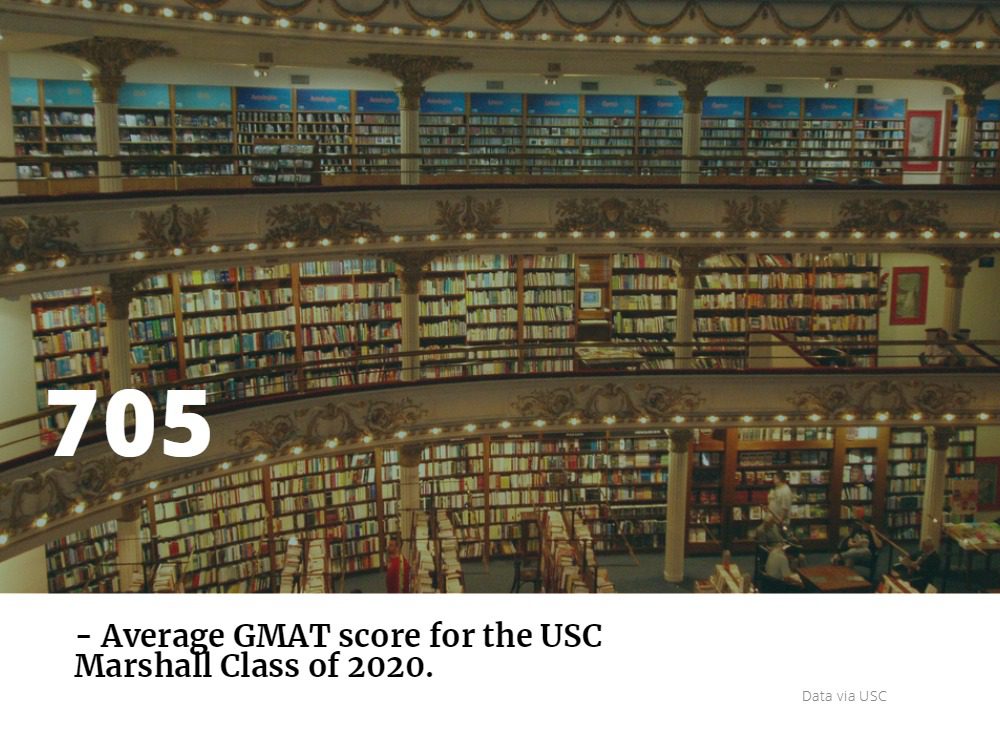
An overall look at the USC Marshall MBA Class of 2020 already reveals the ways more women in a program can have a broader impact on the school and the student’s future careers. “This year’s applicant pool was the strongest in our program’s history,” commented assistant dean and full-time MBA director at Marshall, Evan Bouffides. “They brought the highest GMAT score and the highest average GPA. The women in particular were extraordinarily well prepared.”
There may be a number of reasons why the number of women in MBA programs has historically remained low. Different studies have looked at factors like the time it takes to complete an MBA degree, work experience required, and the overall return on investment. Reasons may also reflect the gender pay gap, which makes the return on investment significantly lower for women, who studies show could make anywhere from 3 percent to 36 percent less than their male counterparts.
YOU MAY ALSO LIKE: The Best U.S. Employers for Women
Thankfully, schools like USC understand the benefits that women MBA graduates can add both to the school and workforce. Over recent years, the university has taken purposeful measures to increase gender diversity among applicants, such as programming focused on women. The investment of creating diversity at business schools mirrors an overall focus on diversity throughout the business world, which means that schools like Marshall can get ahead of the game in creating a diverse and appealing talent pool for employers.
“With more than 50 percent of our 2020 class women, it gives us a talent pipeline that employers are hungry to tap into as they go about increasing the diversity of their executive staffs,” said Mark Brostoff, Assistant Dean and Graduate Career Services Director at Marshal. “Recruiters are very happy with this great news.”
Inside the McCombs MBA Class of 2020
After its exhaustive evaluation of more than 2,000 applications from around the world, UT Austin’s McCombs School of Business just released a first look at the profile of its full-time MBA Class of 2020. This coming year, the admissions committee chose a diverse and highly driven cross-section of MBAs-to-be.
Meet the McCombs Full-Time MBA Class of 2020
The McCombs admissions team thoughtfully considered the class by connecting with applicants through a variety of outlets including MBA events, the online application, and applicant visits to campus. Here are a few of statistical highlights McCombs wants to share about its incoming students:
- 289 students total
- 38 percent female
- 25 percent international students
- 703 average GMAT score
- 5.6 years of work experience on average
- 28 years old on average

The experience the incoming Class of 2020 will bring to campus is equally diverse. The top four pre-MBA industries include consulting (15 percent), finance/banking (14 percent), technology (13 percent), and energy (13 percent). Other industries represented in the class are government, consumer products, media/entertainment, healthcare, real estate, manufacturing, non-profit, retail, travel, and venture capital, among others.

Part of what helped the McCombs admissions team assemble such an accomplished incoming class is the school’s increasingly strong performance in closely watched MBA rankings. The school’s MBA program was ranked 17th by U.S. News and first place in terms in the category of “Best Value.” This later accolade was influenced in great part by the strong return on investment McCombs graduates report and the support of a dedicated career management team. Some 92 percent of the Class of 2017 received job offers with an average starting salary of $116,403, along with a signing bonus of $28,280.
Apply for the McCombs Class of 2021
If you’re interested in joining McCombs’ next full-time MBA Class of 2021, applications open soon. You can prepare by taking a look at the school’s new application essay topics, attending an upcoming MBA event, or reading McCombs’ GMAT/GRE blog series.
This article has been edited and republished with permissions from our sister site, Clear Admit.
Turning Ocean Garbage Into Helpful Prosthetics, and More – Chicago News
Let’s explore some of the most interesting stories that have emerged from Chicago business schools this week.
How “Speed Factories” Help Companies Adapt to Capricious Consumers – Kellogg Insight
In a new study co-authored by Northwestern Kellogg Professor of Managerial Economics and Operations Jan Van Mieghem, Vlerick Business School’s Robert Boute, and Cardiff Business School’s Stephen Disney, the trio survey the return on investment for “speed factories” or local-market facilities “designed to quickly pump out products with shorter life cycles and less predictable demand.”
In the e-commerce age, speed factories are in high demand for manufacturers of realms of sneakers and sports apparel where they “offer fast turnaround to meet demand [for] custom-made products for very small local markets.”
Van Mieghem writes, “Amazon and fast-fashion trends mean that companies have had to increase their speed from product design to delivering that product to customers. If things must happen in days or weeks rather than months, you can’t be doing that from somewhere in Asia.”
The catch is that production costs are often extremely high. However, the trio found that speed factories are “worthwhile, despite their cost, and are best used as part of a portfolio of on and offshore production.”
Van Mieghem adds, “It’s about maintaining the flexibility to bring certain products in and move others out of a speed factory as needed.”
You can read more about the trio’s research here.
Anacortes Couple Turns Ocean Plastics into Prosthetics – K5 News
Gies College of Business Online MBA (iMBA) student and Anacortes, Washington resident Chris Moriarty and his wife Laura co-created the nonprofit Million Waves Project, which “takes littered plastics from the beaches for use in the creation of prosthetics.”
According to a recent profile on Seattle’s K5 News, “It takes just 15 plastic bottles, $45, and two-and-a-half days to make one hand. The couple uses open source software, a company that processes the plastic into filament and a 3-D printer.
In the K5 profile, Chris said, “We thought, wouldn’t it make a lot of sense to take something deplorable in one sense and something heartbreaking in another, put them together and see what we could do.”
Laura adds, “It is daunting. Life is daunting. But like we tell our kids, that doesn’t mean you don’t move forward and try.”
Taking Stock of Market Uncertainty – Quinlan School of Business Stories
The Loyola University Quinlan School of Business blog recently profiled Assistant professor Hae mi Choi, Ph.D. about her research on how macroeconomics and market uncertainty influence financial analysts’ incentives over time.
Professor Choi explained that “financial analysts’ incentives and their forecasting performances are affected by market uncertainty, [which is] when investors have difficulty assessing the current and future market conditions because there is a lot of volatility within the market.”
Choi explains the value of her research to Quinlan students:
“If you want to be a good investor, you need to not only understand what’s going on within a firm, but also the macroeconomic conditions and the stock market conditions in general. Understanding how other investors in the stock market process information and how financial markets function is fundamental, as it impacts the wealth of us all.”
You can read the full interview here.
Columbia Finds Surprises That Hurt Advertisers, and More – New York City News
What’s going on in New York business schools this week?
Study by Columbia Business School Finds Search Tools Like Broad Match Can Hurt Advertisers More Than It Helps – Columbia Business School Blog
New research co-authored by Columbia Business School associate professor of business Kinshuk Jerath calls into question the efficacy of search tools like broad match, which automate the process of “figuring out all the possible keywords that consumers might search for.”
According to the article, paid search ad spending will reach nearly $40 billion in the U.S. alone by 2019. Jerath writes, “Tools like broad match have led to too many advertisers competing over the same keywords, because now bidding on keywords is so easy. The result is that the search engines are actually the only real winners.”
In a paper entitled Keyword Management Costs and “Broad Match” in Sponsored Search Advertising, Jerath and co-authors Wilfred Amaldoss from Duke Fuqua and Amin Sayedi of UW Foster found that “broad match is only effective to a point, a threshold driven largely by the accuracy of broad match that is controlled by the search engine, not the advertiser.”
“Anything that makes advertising cheaper creates more competition—and can ultimately hurt your return on investment. “
You can read more of the research here.
Deloitte CEO Cathy Engelbert to Lehigh Graduates: ‘Do What Hasn’t Been Done’ – Lehigh College Business and Economics Blog
Deloitte CEO Cathy Engelbert, Lehigh College Business and Economics ’86 graduate, used her recent commencement address to share three life lessons that stressed to graduates of Lehigh’s 150th Class the importance of “always remembering what matters to them most.”
Engelbert advised students to “do what hasn’t been done” and “find creative, impactful ways of using new technologies for good.” She said, “I encourage you to stay optimistic and play an active, key role in carving the path leveraging your uniquely human skills—like creativity, empathy, communication, and complex problem-solving.”
Her second piece of advice was to “schedule your personal updates,” just as one might update “various devices to ensure they are operating at peak performance.”
Engelbert’s third and “most important” lesson was to “stay anchored on what matters to you most.”
“I’m sure many of you have a purpose you’re passionate about. That doesn’t end today with graduation. You can carry that through whatever you’re going to do next … from graduate school to entering the workforce. There’s a push to come together as social issues grow in depth, severity and priority. I challenge you to take a bold stance and make a difference in your day-to-day work.”
Read the full commencement report here and footage from the ceremony below.
Professor Scott Galloway discusses how Walmart is positioning itself to compete with Amazon – NYU Stern News
NYU Stern School of Business professor of marketing Scott Galloway was recently interviewed as part of a CNNMoney piece on Walmart’s plan to take on Amazon as the country’s preeminent universal retailer, particularly when it comes to online grocery delivery. Galloway writes:
“Walmart is the only firm that has the management, capital and the scale to compete with Amazon. They’ve probably done as good a job of getting off their heels and on their toes as any retailer in the world.”
You can read the full story here.
Top MBA Recruiters: Starbucks
American coffee behemoth and casual status symbol Starbucks has become one of the most well-known companies in the world with over 27,000 stores and a massive headquarters located in Seattle, Washington. The company is known its quality service, customizable drinks, and pre-packaged items. As it continues to grow, so does the appeal for a Starbucks corporate career.
The company got its start in 1971 when the first store was opened in the Pacific Northwest. However, it wouldn’t be until 1987, when Howard Schultz took over and re-branded the company that they would open their first location outside of Seattle. By 1989, it had 46 stores and were roasting over two million pounds of coffee.
In 1992, Starbucks released its initial public offering (IPO) with a revenue of $73.5 million and a market value of $271 million. By the end of the year, the share price had risen over 100 times the earnings per share of the previous year. Now, the company earns more than $22.3 billion per year and employs over 238,000 people worldwide.
You can’t talk about Starbucks without talking about the location of its headquarters in Seattle. Located in the city’s SoDo neighborhood, Starbucks can be found in the largest multi-tenant building in the city with over 2,200,000 square feet of space. But while the building is impressive, it’s the city that really stands out.
Washington was ranked as “America’s Top State for Business in 2017,” by CNBC, and Seattle is the city to be in. According to Outside Magazine, Seattle is one “America’s Best Towns Ever,” and a PWC survey considers it one of the nation’s most innovative cities. There’s much to love about Seattle from its opportunities for adventure, laid-back culture, and strong economy, which grew 3.7 percent last year—almost 2.5 times the national average.
MBA Recruiting at Starbucks
Starbucks is a major MBA recruiter. It looks for MBA students who understand who Starbucks is as a company. As well, it recommends reading former CEO Howard Schultz’s book, Onward: How Starbucks Fought for Its Life without Losing Its Soul and following the company on social media including LinkedIn, Twitter, YouTube, and Instagram. The company wants to know why you want to be a part of it and how you fit in with the Starbucks Mission Statement.
Other required qualities include:
- Strong analytical and technical skills
- Ability to analyze business trends
- A strong team player who can collaborate cross-functionally
- Strong interpersonal skills
- Great communication skills orally and in writing
- Strong organizational and problem-solving abilities
- Ability to balance priorities and meet deadlines
You may also be required to have a deep understanding of financial planning, forecasting, and inventory management. You should also have a strong understanding of marketing fundamentals and be able to understand sales, return on investments, and profit and loss.
As for where Starbucks recruits, many MBA programs feed into the company including:
- The University of Washington Foster School of Business
- Dartmouth College’s Tuck School of Business
- The Wharton School at the University of Pennsylvania
- Arizona State University’s W. P. Carey School of Business
- The University of Michigan Ross School of Business
Salary & Benefits of Starbucks Employment
According to PayScale, MBAs hired at Starbucks are paid well:
- Master of Business Administration (MBA), Business Administration – $128,500
- Master of Business Administration (MBA), Accounting – $65,111
- Master of Business Administration (MBA), Marketing – $109,823
- Master of Business Administration (MBA), General Business – $89,000
- Master of Business Administration (MBA), Global Management – $77,419
As for benefits, Starbucks offers a tailored benefits package that’s called “Your Special Blend,” which includes Medical, Dental and Vision coverage as well as life insurance, disability, adoption assistance, paid vacation, a 401(k) Savings Plan, stock investment, one free pound of coffee per week, and more. There are also perks that include in-store merchandise discounts, matching gifts programs, etc.
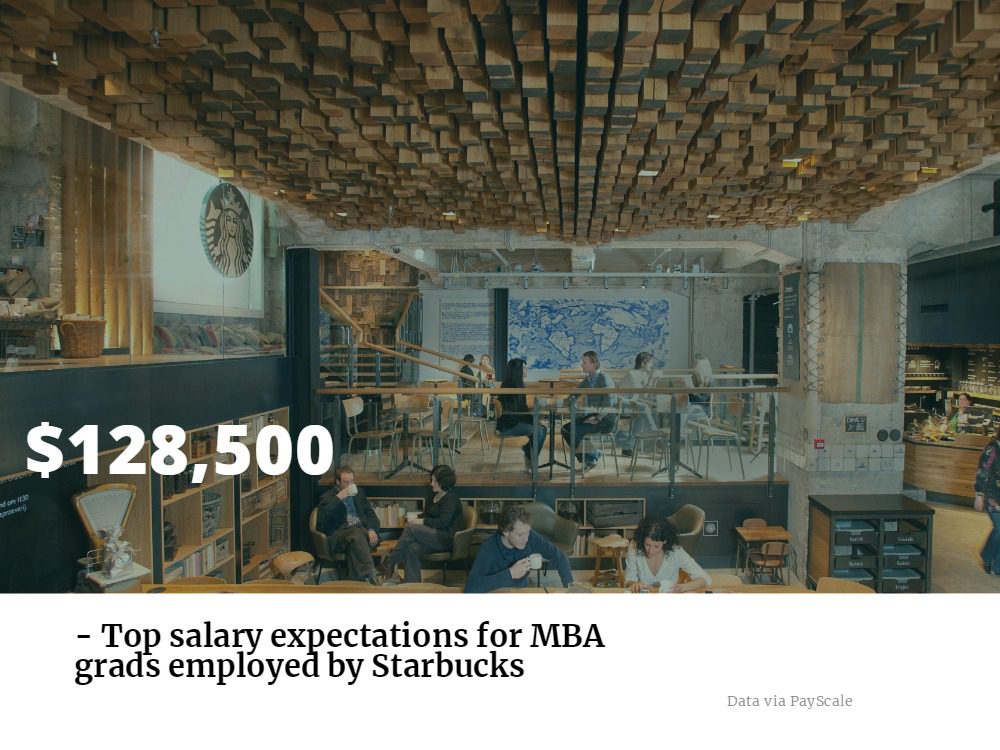
Interning at Starbucks
Every year, Starbucks offers an exclusive ten-week internship program in Seattle that is designed to provide a robust and meaningful experience. MBA students who are chosen to participate can expect to participate in high-impact, business relevant projects that have well-defined goals and expectations. Interns also have access to mentorship and leadership opportunities. Graduate internship applications open from January to February each year for the summer program.
According to Peter Kazarian, a ’16 UW Foster MBA graduate who interned at Starbucks, the intern program is very deliberate and well laid out.
“With part MBAs and the rest technical and undergrad interns, there was a formal on-boarding program, weekly meetings with SVP/C-suite leadership, and great experiences like a Sounders game or fancy catered dinners at museums,” Kazarian explained in a blog. “My department was under the Channel Development arm of Starbucks, which included consumer packaged goods and anything else not in a Starbucks retail store, like grocery bottled fB2brappuccinos, licensed stores, and in my case, bulk B2B customers like airlines, hotel chains, restaurants, and campus cafes. As part of the Digital and Loyalty team, my main project involved e-commerce enhancements to our B2B team’s website, and forecasting new sales revenue and cost savings from these changes.”
As for what Kazarian enjoyed most about his experience, he enjoyed the free pound of coffee each week. He also loved getting to know his fellow MBAs who are now good friends of his. “I had a great experience … and I’ll be returning to Starbucks … as a Product Manager,” he said.
What Toronto MBA Can You Earn in the Least Amount of Time?
It’s easy to see why earning an MBA could be a huge boost to your career—but if the thought of putting those things on hold for two years while pursuing your degree is a source of great anxiety, you are not alone. Many who might otherwise have the ambition and skills to thrive in an MBA program may simply not have the option of putting their life on hold for two years and enrolling in school full-time. This can mean that many talented and driven individuals won’t have access to the kind of opportunities for advancement and growth that an MBA provides.
Not every MBA program requires two years of full-time work. But part-time and weekend programs can often have the opposite problem for individuals eager to earn their degree and reap its benefits. While such programs allow students to continue working full time while earning their degree, they can often take up to three years or more to complete.
For individuals driven to earn their degree quickly, there are a number of programs that allow students to earn an MBA in under one year, reducing the amount of time without an income and moving allowing for a quick path to the salary increase and advancement opportunities an advanced degree is likely to offer.
In Toronto, many top business schools offer accelerated or abridged versions of their MBA programs that can be completed in as little as eight months.
The Fastest Toronto MBA Programs
Ivey Business School – Western University Canada
The Accelerated MBA at the Ivey Business School is available for students who have recently graduated from Ivey’s HBA program, allowing students to earn their degree in just eight months—without needing to take the GMAT exam. This makes it not only among the fastest Toronto MBA programs you can find, but also among the most unique.
The program takes place over the course of eight months, building on the base of knowledge earned during the HBA program. The courses are designed to refresh students on business fundamentals, while also providing career-centered electives in fields like marketing, finance, entrepreneurship, and more. The program also allows students to pursue study abroad through an optional trip to China, South East Asia, or South America.
The benefits of Ivey’s Accelerated MBA are evident for graduates: 97 percent of students earned an offer of employment by within three months of graduating, reporting an average post-graduate salary of $107,116. About 65 percent of employment offers were also facilitated by the university, demonstrating the indelible benefits of the connections made while in school.
DeGroote School of Business – McMaster University
The DeGroote School of Business at McMaster University also offers an Accelerated MBA for students graduating from a Canadian university with their undergraduate degree in business. Attending full-time, the program can be completed in as few as eight months, making it one of the most time-efficient MBAs available to students in Canada.
By exempting students from the required first year MBA courses, students can earn their degree quickly while also cutting their overall tuition expenses in half and accelerating their path to employment. The program is designed for students who have earned their undergraduate business degree in the last ten years, and have at least one year of professional experience. Students may start the program in either September or January.
Wilfrid Laurier University – Lazaridis School of Business & Economics (Toronto Campus)
The One-Year MBA at Wilfrid Laurier’s Lazaridis School of Business & Economics is a unique program that immerses students fully in an integrated model of business education, asking students to constantly make use of the knowledge gained during the program through team projects, case study analysis, and as consultants for a real business. The degree is designed for graduates from any four-year university with at least two years of professional work experience.
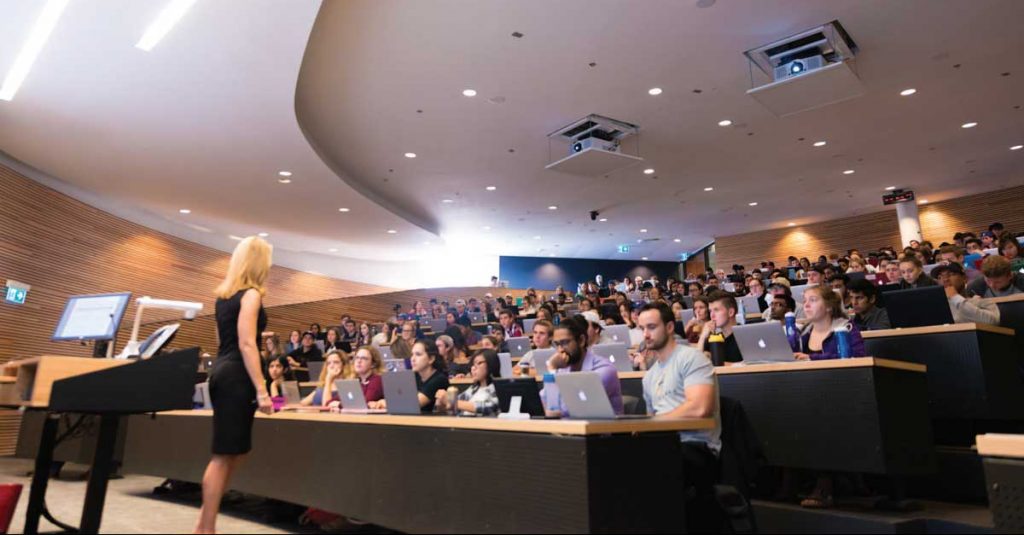
Wilfrid Laurier University also offers one of the fastest MBAs you can earn in Canada, with the One Year Lazaridis School of Business & Economics MBA.
The Lazaridis MBA can be completed in just twelve months, offering one of the best return on investments of any Canadian MBA program. Located in Waterloo, a center of technology and finance within Canada, the One-Year MBA also allows students to choose from over 10 different MBA concentrations, such as entrepreneurship, strategic management, supply chain management, and organizational behavior.
Schulich School of Business – York University
The Schulich School of Business‘ Accelerated MBA allows students to bypass many of the Year 1 MBA requirements, cutting the time it takes to complete the degree by half. The program can be pursued either on a full-time or part-time basis, and can be completed within just eight months with the full-time option. The program is reserved for students who have earned a BBA or BCom degree in Canada within the past ten years. With 89 percent of all Schulich MBA students earning a job offer within three months of graduation from their respective programs, the Accelerated MBA gives students the chance to join the workforce much sooner and quickly reap the benefits of their education.
Rotman School of Management – University of Toronto
For prospective MBAs with several years of professional or managerial experience, another way to quickly earn an MBA is by pursuing an Executive MBA, designed specifically for senior managers and executives. Executive MBA programs, such as the One-Year EMBA at the University of Toronto’s Rotman School of Management, can typically be earned in 13 months or less and are designed to accommodate the schedule of a busy professional. While executive programs typically cost more than other MBA variations, the Rotman One-Year MBA stands out as the fastest EMBA you can earn in the Toronto metro.
What is the Most Valuable San Francisco MBA?
There’s no doubt: San Francisco is a great city to earn your MBA. Located near Silicon Valley, business schools throughout the area provide not only an excellent education but also opportunities to interact with many tech and industry leaders in the area. But which MBA programs in San Francisco are the best?
This is not an easy question to answer. You can check rankings, to see which MBA programs perform well based on surveys and statistics provide to The Financial Times, U.S. News and World Report, and The Economist. And that’s a great place to start, but probably the most essential value when determining the right MBA program for you is your return on investment (ROI).
The ROI of an MBA program is one of the best indicators of what your MBA is actually worth. It looks at statistics such as average salary increase, post-graduation employment, tuition cost, cost of living, and more. To help you out, we looked in-depth at the best business schools in San Francisco to see which offer the best ROI. Continue reading…
Bloomberg Businessweek Praises Rutgers, and More – New York News
Let’s explore some of the most interesting stories that have emerged from New York business schools this week.
Bloomberg Ranks Rutgers MBA No. 1 in the Northeast in Job Placement – Rutgers Business Blog
In its “Best Graduate Business Schools of 2017 ” survey, Bloomberg Businessweek ranked Rutgers Business School (Newark, New Brunswick) as the top business school in terms of job placement within the Northeastern United States,. coming in second overall in the United States. Andy Heller, RBS MBA ’11 and current senior associate director of payor and health system marketing at Boehringer Ingelheim sang Rutgers’ praises in terms of preparing him to succeed in the corporate world.
“That kind of experience has helped me each and every day since graduation. Having diverse perspectives on our team ensured that our solutions would be differentiated, yet relevant, and impactful,” Heller notes.
In addition, RBS topped its fellow Big Ten competitors when it came to return on investment, narrowly edging out the University of Iowa College of Business, and Northwestern University’s Kellogg School of Management. The latter of which offered a higher multi-year ROI for potential MBA students, but cost much more in terms of tuition.
Read more about Rutgers’ rankings and accolades here.
Are You a Good Fit for the Executive MBA/MS in Healthcare Leadership Program? – Johnson Business Feed
The Executive MBA/MS in Healthcare Leadership program at Cornell’s SC Johnson School of Management “integrates the general management curriculum of Johnson’s Executive MBA programs with the deep healthcare expertise of Weill Cornell Medicine’s Healthcare Policy and Research Department.” The joint program was developed to “reflect the future of healthcare” and help “sharpen and deepen the skill sets of healthcare professionals through business and healthcare leadership education,” according to the school.
“Today’s healthcare leaders need to be open to knowledge from different vantage points so they can advance progressive healthcare agendas, locally and nationally. Many healthcare leadership programs are exclusively for physicians. However, as we developed this new program, the physicians we spoke to expressed interest in an executive healthcare program that welcomed non-clinicians from different sectors of healthcare—not just practitioners.”
Take a look at the makeup of the Executive program below:
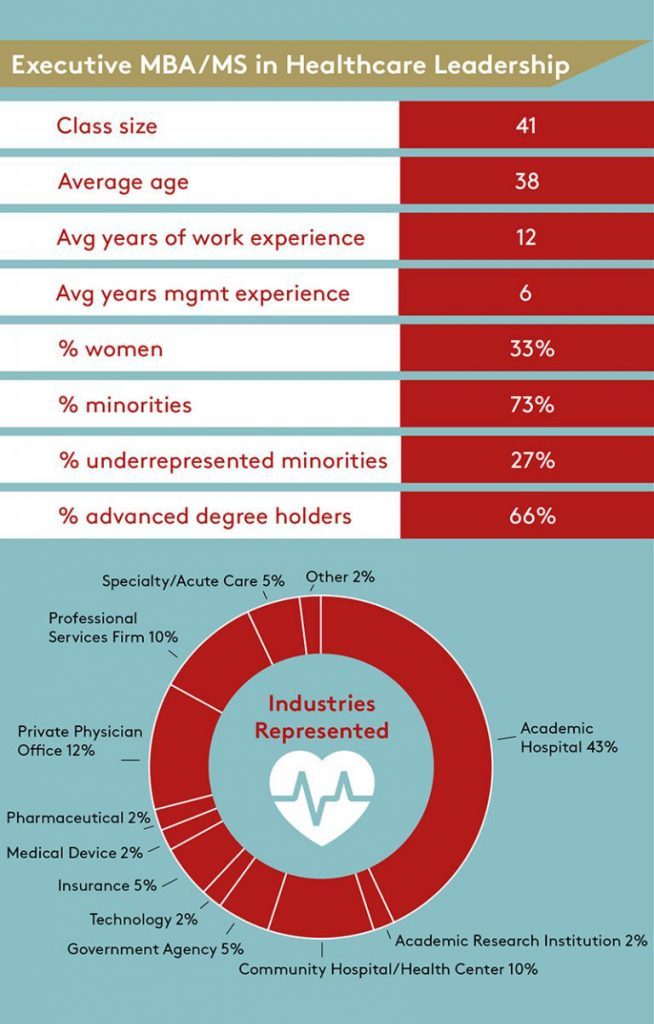
You can read here to learn more about what the program looks for in terms of applicants.
Rewiring Hidden Biases for Better Outcomes – Gabelli Connect
Fordham University’s Gabelli School of Business recently hosted a talk by Harvard professor of social ethics Mahzarin Banaji who unpacked the hidden biases of well-intentioned people—that is, “the beliefs that live in the subconscious and are formulated due to various exposures throughout one’s life.”
Banaji explains:
“A bias is nothing more than a tilting away from neutrality. There’s bias in the mind of the receiver and the applicant. We have to work with the very groups that are holding themselves back and educate those who are holding them back. We are capable of change by how many times we stretch those muscles.”
Learn more about Banaji’s take on unconscious biases here.
How To Begin Your MBA Search, Pt. 3: Recognizing the Best Resources
You can find the first and second installments of our ongoing “How To Begin Your MBA Search” here.
So, you’ve narrowed down the list of business schools to which you’re applying, keeping in mind location, student body make-up, potential networking opportunities, the return on investment, and your professional goals. But while there are an additional host of ineffable qualities that guide a prospective MBA to one program or another, you must also keep in mind the resources of the programs that make up your short list. The importance of these resources will certainly depend upon your own subjective needs, but most potential MBAs will find it necessary to consider the following factors before making decisions on program choices.
Money, Money, Money
Suffice to say, business school is not cheap. Tuition at some programs can soar north of $60,000 USD per year, and unless you are currently working and your employer is chipping in, you will probably worry about how you will pay for school (particularly if you’re out of the workforce). Thus, sussing out which schools provide merit, and finding need-based scholarships is a good method of finding which schools might make the top of your list. And while a significant return on investment is almost guaranteed with an MBA, it goes without saying that graduating with less debt is preferable to graduating saddled with loads of it. Luckily, according to U.S. News & World Report, many more schools are offering such financial assistance, so if you do your research and get busy applying for fellowships and awards, you might be able to lighten the dreaded b-school burden!
I Went Looking for a Job and Then I Found a Job
Hillary Schubach of Shine MBA Admissions Consulting says that potential b-school applicants should ask, “Are there campus resources, student organizations, and activities that align with your interests?” As discussed in the second part of our series on starting the MBA search, while building a network is important, a b-school’s career services resources are also well worth researching. Where are alumni placed? Does the career services office seem robust and well-staffed, and are the advisors in-house or outsourced? These should be pertinent questions to you and any future MBA.
Know Who You’ll Be Learning From
Finally, before settling on any program, identify the professors whom you’ll most likely be learning from, and maybe try to find out more about their teaching style. Stacy Blackman of Stacy Blackman Consulting suggests asking, “what teaching methods appeal to you? Are there particular teachers, courses, fields of study or extracurriculars that appeal to you at certain schools?”
While some of these questions might have been answered when you asked yourself questions regarding where you want to end up after graduation, it is worth reiterating that if you’re unable to learn in certain environments or within certain teaching styles, you won’t be able to achieve your goals as smoothly.
Schubach gives the following advice :
“Core classes and electives that fit your career goals are extremely important. Do your needs align with the academic strengths of the school? Are you looking for a general management program, or one where you can select a concentration in your target field?”
In other words, it isn’t just the professors, but the structure of the program itself that is worth looking at closely— are the core classes suitable to your end goals? Do you need more or less structure in an academic setting?
While it seems like there are an infinite number of factors to weigh when finding the right MBA program, remember that on graduation day, you will want to look back on your b-school experience as one that was well worth it, which makes the questions all the more necessary.
How to Get Your Employer to Pay For Your MBA
Earning an MBA holds tons of value in the business world—an advanced business degree can open doors that may otherwise have been closed, and boasts a high return on investment thanks to the top-level salaries that MBAs command.
Graduate school—and all of the coursework that comes with it—can be an intimidating challenge, but paying for it doesn’t have to be. Aside from scholarship, grant and fellowship opportunities at business schools across the country, more and more companies are placing a higher importance on tuition reimbursement programs, and expanding opportunities for paid MBA tuition reimbursement.
How can you get your employer to pay for your MBA studies? Let’s take a closer look.
Getting Your Employer to Pay For Your MBA
First thing’s first: You need to find out if your current employer offers tuition reimbursement to its employees. The terms of reimbursement vary depending on the company, with some corporations not offering any sort of program at all. Those that do offer some sort of compensation may do so on a course-by-course basis, or as a lump-sum reimbursement package for coursework in relevant degree plans.
“Organizations typically support MBA pursuits for two reasons,” J. Todd Rhoad, managing director of Atlanta’s BT Consulting, told USA Today. “Employee development and succession planning. In the first case, companies support the cost of MBA programs as part of their commitment to employee training and development.”
If you want to convince your employer that your education is worth investing in, you’ll need to show that earning an MBA will further your business acumen and understanding of your industry, and ultimately help your company reap those benefits.
“Usually, an employee has to already been delivering great results within the company,” Roderick Lewis, international relations director at the ISCTE Business School, University Institute of Lisbon, told Business Insider.
“If you haven’t already convinced your company, then asking them to [sponsor your education] becomes really difficult,” Lewis says.
USA Today also outlined a few checkboxes to hit when determining how valuable earning an MBA would be for your organization:
- Do current members of middle or upper management hold advanced business degrees?
- Does your company have the available revenue to invest in employee education?
- Would someone with the type of advanced training you seek bring clear advantages to the company?
If those point hold true in your situation, then start researching which programs specialize in providing the skills that your company needs. Keep in mind: You do not have to limit yourself to business schools in your metro thanks to popularity of Online MBA programs. There may have once been a stigma against online programs, but the of the matter fact is that many of the top online MBAs on U.S. News & World Report’s annual rankings also rank highly on the publication’s top campus-based graduate business programs list.
Some of these schools include:
- University of North Carolina – Chapel Hill (Kenan-Flagler)
- Indiana University – Bloomington (Kelley)
- Temple University (Fox)
- Arizona State University (Carey)
- University of Florida (Hough)
- Carnegie Mellon University (Tepper)
- University of Texas – Dallas
Once you’ve found the right program, you’ll want to craft a brief proposal for your employer. In it, you’ll want to mention how you fit the company’s tuition reimbursement policy, and list the advantages that continuing your education can bring you and your company. Don’t shy away from providing data on how much assistance you may need and how this investment will pay off for everyone, while also ensuring your employer that you’ll remain committed to the company during your degree program, or won’t jump ship after earning your degree.
“A proposal should address the benefit to the company,” Rhoad says, “(including) areas where the company could improve and how you will help them, a review of the courses to be taken and how they will provide knowledge that can help improve the company’s performance.”
Companies That Provide MBA Tuition Reimbursement
Investopedia recently compiled a list of companies have stated that they place a high value on their tuition assistance benefits, and provide tuition reimbursement for the educational costs of an MBA.
According to Investopedia, consulting companies lead the market in tuition reimbursement programs for MBA courses. These firms also pay the highest salaries for MBA alumni. Deloitte has the most robust tuition reimbursement plan, providing employees with up to $10,000 per year in MBA reimbursements. The firm requires two years of work with the company and a commitment to work for the company after graduation in order to receive the tuition assistance benefit.
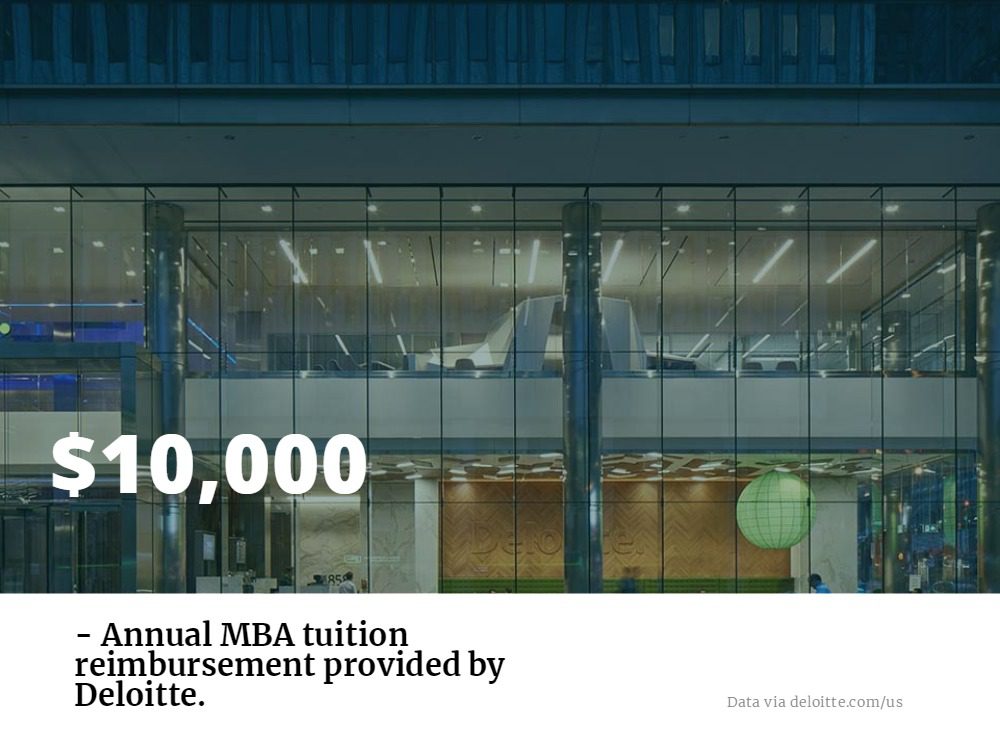
Financial institutions and banks also place a high value on employees with MBAs, and provide tuition assistance. One example is Bank of America, which provides employees with annual tuition assistance of up to $5,250 for advanced degree coursework. Wells Fargo also has a track record of paying for MBAs, doling out up to $5,000 annually for tuition expenses.
The booming tech sector is also hiring MBAs left and right, with some firms developing their MBA talent in house by offering to pay MBA tuition expenses. Apple tops the list of tech companies offering tuition assistance, providing reimbursement of up to $5,000 annually. MBA degrees are even more coveted in the the specialty defense technology sector, as Raytheon, one of the top defense technology companies in the world, offering to pay up to 100 percent of employees’ college tuition for graduate school.
Other leading companies offering tuition reimbursement to employees include:
- Chevron: A market leader in the energy sector, Chevron offers offers tuition reimbursement of up to 75 percent for its employees.
Ford: Ford’s education tuition assistance program provides employees with tuition reimbursement of up to $5,000 annually for an MBA. - Procter & Gamble: This firm has one of the leading tuition reimbursement benefits in the consumer goods industry, providing reimbursement for up to 80 percent of educational costs with a limit at $40,000.
- AT&T: This telecom giant provides employees with up to $5,250 annually for tuition assistance, for a maximum reimbursement of up to $25,000 for graduate school courses.
How NYC Business Schools Help the Underprivileged Applicants
Pursuing an MBA is a shrewd move for anyone looking to earn a competitive salary right out of school. Though attending a renowned school can up the price tag of earning an MBA, it may also increase the overall return on investment. According to an article in U.S. News & World Report, “… graduates of top-tier business schools usually earn higher starting salaries than their peers who went to lower-ranked schools.”
It’s not jut the opportunity to have a lucrative job right out of school that makes a high starting salary appealing. An enviable starting salary could mean more earning potential down the line. However, a top-tier school may seem out of reach for low-income applicants. After all, how can you enjoy the return on investment if you can’t afford to invest in the first place?
Luckily, many prestigious business schools offer resources for students from different socioeconomic backgrounds. Below, we’ve outlined the resources available for low-income applicants at five of New York City metro’s best business schools.
How NYC Business Schools Help the Underprivileged
Columbia Business School
Columbia Business School offers need-based awards to many students, which may result in anywhere from $7,500 to $30,000 in tuition support. Nearly half of applicants receive need-based scholarships, which are automatically renewed at the start of the second year. Columbia students can also apply for private and federal loans. To create incentive for students to choose careers in public and nonprofit fields, the school offers a Loan Assistance Program for students who utilize their education to pursue these paths. Students are eligible to apply for this program for up to five years after graduation. Depending on the extent of students’ debt, they may receive anywhere from $2,000 to $10,000 of annual support. Columbia students may also receive merit-based scholarships, such as the Columbia Fellows Program, which may cover full or partial tuition and is granted to applicants with an outstanding track record in leadership and creativity.
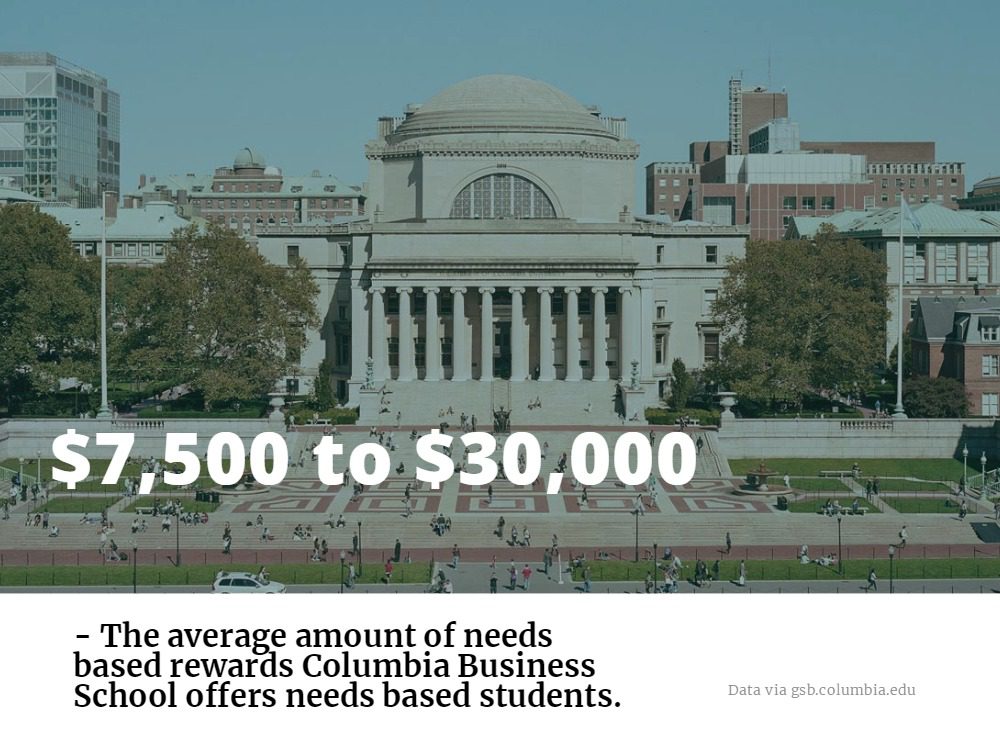
Stern School of Business—New York University
NYU’s Stern School of Business offers a variety of scholarships for high-achieving applicants. According to the school’s website, nearly a quarter of students who enter the full-time MBA program receive a merit-based scholarship. There are also additional merit-based opportunities for students coming from different backgrounds and perspectives. Scholarships like the Advancing Women in Business Scholarship and the Forte Fellowship are particularly geared toward female-identifying students, to support women in business. The ROMBA Fellowship aims to help LGBTQ students succeed in business education. The Consortium Fellowship exists to increase the number of minorities such as Hispanic Americans, Native Americans, and African Americans in business school as well.
Gabelli School of Business—Fordham University
At the Fordham University Gabelli School of Business, graduate students may be eligible for federal financial aid, merit scholarships, or a variety of graduate assistantships. Awards based on academic excellence range from $10,000 to full tuition. Exceptional students may be eligible for awards like the Dean’s Premier Scholarship, which includes a $20,000 living stipend, and may include a stipend toward one of Fordham’s global programs. Students can also apply for a plethora of need/merit-based scholarships, like the Hitachi Diversity and Inclusion Scholarship, which seeks to help underrepresented minorities finance their education.
Rutgers Business School, Newark and New Brunswick
The Financial Times ranked Rutgers Business School among the top 50 MBA programs for return on investment in 2017, citing a 130 percent increase in salary for students within three years of completing their degree. Moreover, the school’s website states that, “More than 80 percent of Rutgers students receive some form of financial aid.” Moreover, at $31,011 per year (not including fees), this program is far more affordable than many other prestigious schools. Students can apply for federal or private loans, grants, and an array of scholarships. In addition to the awards offered by the Rutgers Business School Graduate Scholarship Fund, the Rutgers website lists 30 fellowships, scholarships, and partnerships. The Ralph Bunche Fellowships, for example, provide tuition remission, and a $15,000 living stipend to minority students from disadvantaged socioeconomic backgrounds.
SC Johnson Graduate School of Management—Cornell University
Around 30 percent of entering the SC Johnson Graduate School of Management students receive some level of scholarship support. Scholarships like the National Society of Hispanic MBA’s (NSHMBA) and the TOIGO Fellowship specifically seek to help underrepresented minorities. The MD MBA Dual Degree Program and Lee Family Scholarship supports students on the rigorous path to receive their MD/MBA. Additionally, Cornell’s Park Leadership Fellows Program awards full tuition to up to 25 MBA applicants annually. The award is granted based on personal and professional achievements, academic performance, social contributions, and leadership. Students can also apply for federal and private loans.
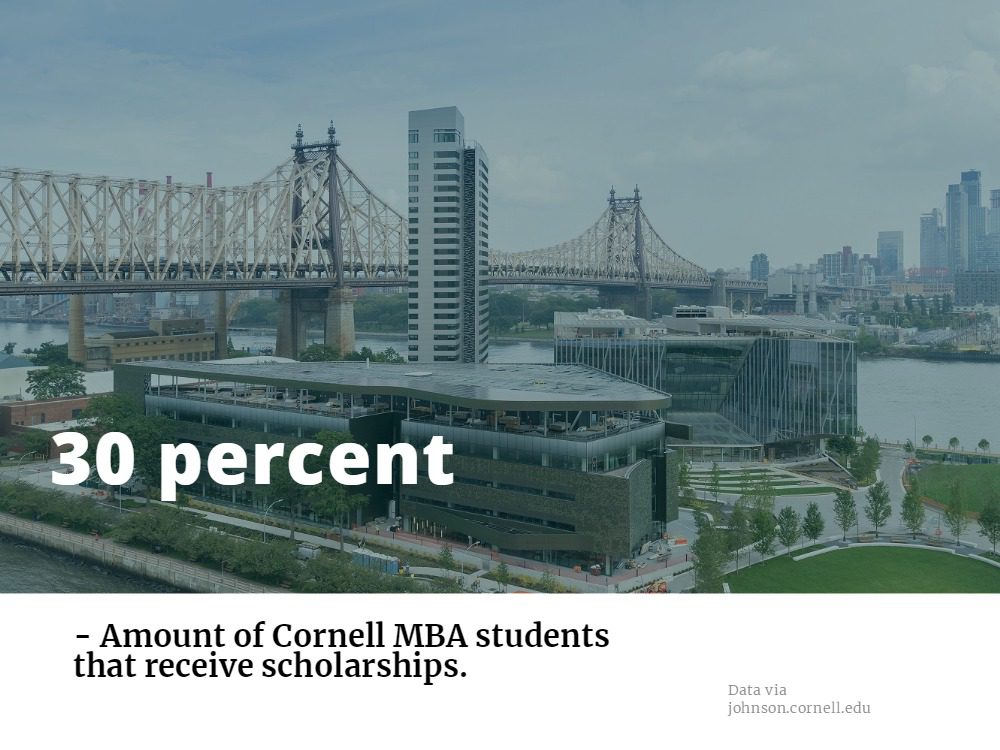
DeGroote Business Looks Back on Successful 2017, and its Future
The MBA program at the McMaster University DeGroote School of Business is changing the game for prospective MBAs in Canada, offering a valuable return on investment, strong network of partners and alumni, and diverse student body.
Since 2010, the school’s full-time and co-op MBA programs have been based at McMaster’s Ron Joyce Center, transforming into a top-rate business education at one of the highest-ranked universities on the planet. In fact, the 2017 Academic Ranking of World Universities named McMaster the 66th best university in the world. Today, the Ron Joyce Center is not just home to DeGroote’s MBA program but also to the school’s Health Leadership Academy (HLA), Executive MBA in Digital Transformation (EMBA), and Digital Transformation Research Centre.
YOU MAY ALSO LIKE: What Are The Most Valuable Toronto MBA Programs?
DeGroote’s MBA program took another step forward just last year, when university staff and faculty took a deep look into best practices throughout North America to reform the MBA into an even more comprehensive business education. Inspired by insights from students, alumni and faculty, the program integrated features such as cohort classes, case studies, and a series of foundation weeks at the start of the program. “The foundation weeks, in particular, introduce critical business skills and principles to new students at the outset of the program,” commented Will Weisner, Director of the MBA program at DeGroote. “As a result, students begin their MBA journey with the foundation to succeed in the classroom, at their co-op jos, and in their leadership and networking activities.”
The numbers don’t lie when it comes to return on investment: something we’ve previously noted in our highlight of the most valuable Toronto MBA programs. In 2016, 102 students graduated from the co-op stream, earning an average of $71,930 after joining the workforce. For the 84 students graduating from the full-time MBA, the average salary $60,125.
There’s more exciting developments for the DeGroote MBA in 2018 as well. Currently, the school is reviewing proposal for a part-time blended MBA that would offer a blended learning experience combining both online and in-residence components. You can read more about whats in store at DeGroote here.
What Are The Most Valuable Toronto MBA Programs?
For prospective MBAs, looking at the price tag of earning a degree can be startling- and may even deter talented business leaders from pursuing an advanced education. The fear is certainly justified: an MBA from some of North America’s top business school can reach upwards of $100,000.
Yet, when considering the well-recorded increase that most professionals witness in their salary after earning an MBA, along with a greater likelihood of finding employment, the seemingly impossible cost of an MBA can seem more within reach.
Factors like the cost of a degree, salary increase after graduation and employment rate of graduates are all key numbers that must be considered together before one can determine the true cost of a degree. Below, we take a glance at these different numbers and round up the Toronto MBA programs that provide the best return on investment.
Ivey Business School – Western University Canada
The Ivey Business School at Western University Canada MBA program began in 1950, and has since established itself as one of the best offerings in the world. The business school’s rich legacy has been recognized again and again by the likes of Bloomberg, which touted its MBA as the 11th best international MBA program in 2017. Ivey, with its main teaching center on Western University’s campus in London, Ontario, offers a variety of MBA experiences, such as an full-time, Accelerated, and Executive MBA. The Tangerine Leadership Centre in Toronto’s downtown business district also offers EMBA courses through the Ivey Business School.
The full-time MBA at Ivey is a 12-month program that costs $88,250 to attend for domestic students and $101,500 USD for international applicants. According to the most recent Ivey employment report, about 91 percent of the 169 students in the Class of 2017 earned a job opportunity shortly after graduation, reporting an average salary of $103,560. More than one-third of the Class of 2017 also earned a singing bonus upon employment with a median value of $15,000. Signing bonuses for Ivey MBA grads ranged as high as $45,000 alone, proving that even with high price tag, the degree can immediately pay off.
Ivey Return on Investment (In USD)
| Ivey MBA Tuition | Median Signing Bonus | Median Annual Salary |
|---|---|---|
| $88,250 | $15,000 | $103,560 |
Schulich School of Business – York University
The Schulich School of Business at York University offers students a number of ways to pursue an advanced business education, from full-time, Executive, and International MBA programs as well as offering Master’s degrees in accounting, finance, business analytics, and more. The Schulich International MBA is the first of its kind in Canada, and the Kellogg-Schulich Executive MBA is North America’s first ever cross-border executive MBA degree. However, length of programs should be taken into consideration, since it will determine the time without a full-time income; an important distinction for students that are looking to enter the workforce as soon as possible. At 16-20 months, an MBA at Schulich will take slightly longer to earn than year-long programs like at Ivey.
Roughly 89 percent of graduates from Schulich’s MBA programs find a job within three months, earning an average base salary of $91,860 USD and an average singing bonus of $12,050. Full-time MBA students at Schulich will pay a tuition of $77,900 during the life of the degree, while part-time students pay $81,000. Meaning, grads typically earn about $10,000 more in their first year of employment than the entire cost of the program.
Schulich Return on Investment (In USD)
| Schulich MBA Tuition | Median Signing Bonus | Median Annual Salary |
|---|---|---|
| $77,900 | $12,050 | $91,860 |
Rotman School of Management – University of Toronto
The Rotman School of Management at the University of Toronto can boast of origins dating all the way back to 1901, when the university first established a diploma program in commerce. By 1972, the School of Business was an official part of the university, and hasn’t stopped growing since. Today, the Rotman School of Management has become universally recognized by the likes of Financial Times the and Bloomberg as one of the best business schools in the country. Located in downtown Toronto, Rotman offers a two-year, full-time MBA degree, but also more flexible options such as part-time morning and evening MBA programs, executive MBA, and an 18-month Global Executive MBA.
The two-year, full-time MBA tuition at Rotman comes with a price tag of $101,350 CAD ($74,999 USD). However, graduates—80 percent of whom typically find employment within three months after earning their degree—saw a median base salary of $85,000 and median signing bonus of $13,500. This salary increase seems to be typical of MBA graduates in Canada, so considerations of employment rate and program duration may be most important when evaluating Return on Investment for top programs in Canada.
Rotman Return on Investment (In USD)
| Rotman MBA Tuition | Median Signing Bonus | Median Annual Salary |
|---|---|---|
| $74,999 | $13,500 | $85,000 |
Comparing The U.S. News Full-Time and Online MBA Rankings
When it comes to business school rankings, U.S. News & World Report issues one of the most comprehensive annual lists. The annual rankings includes separate lists for the “Best Business Schools” and the “Best Online MBA Programs,” but deciding which format is right for you can still be tricky. Continue reading…





